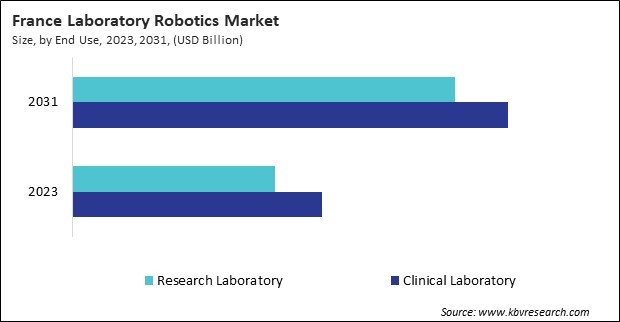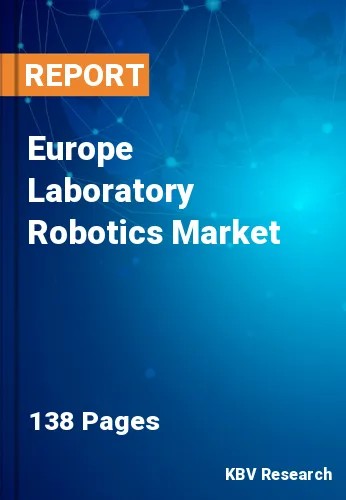The Europe Laboratory Robotics Market would witness market growth of 6.7% CAGR during the forecast period (2024-2031).
The Germany market dominated the Europe Laboratory Robotics Market by Country in 2023, and would continue to be a dominant market till 2031; thereby, achieving a market value of $167.9 million by 2031. The UK market is exhibiting a CAGR of 5.9% during (2024 - 2031). Additionally, The France market would experience a CAGR of 7.8% during (2024 - 2031).

In anatomical pathology laboratories, Robotics automate tissue processing, staining, and slide preparation. This streamlines workflows for cancer diagnosis, tissue analysis, and biomarker discovery. Automated systems also handle microbial culture preparation, antimicrobial susceptibility testing, and pathogen identification, supporting rapid diagnostic testing and surveillance of infectious diseases.
Robotics manage sample storage, retrieval, and tracking in biobanks. Automated freezer systems ensure sample integrity and long-term preservation for biomedical research, epidemiological studies, and personalized medicine. Automated liquid handling systems prepare samples for cryogenic storage, ensuring the preservation of cell viability and genetic integrity essential for applications in stem cell research, regenerative medicine, and tissue engineering.
The UK’s life sciences sector is a biomedical research and innovation hub, driving the demand for advanced laboratory technologies. Laboratory robotics are crucial for high-throughput screening, genomic analysis, and drug discovery processes, enabling researchers to conduct more efficient and accurate experiments. According to the UK Government, the number of life sciences firms in the UK has steadily risen since the 2008/09 fiscal year, reaching 6,850 in 2021/22. These companies operated from 7,910 sites across the UK, marking a 1% increase compared to the previous year.
The turnover generated by UK life sciences businesses amounted to £108.1 billion in 2021/22, reflecting a 13% rise from the turnover of £95.9 billion (in 2021/22 prices) recorded in 2020/21. The UK's life sciences industry increasingly embraces artificial intelligence (AI) and big data analytics, driven by an increasing emphasis on precision medicine and personalized healthcare. Laboratory robotics can integrate with these technologies to automate data-driven processes, analyze large datasets, and accelerate the pace of scientific discovery. Hence, the increasing pharmaceutical industry and life science sector in the region are driving the market’s growth.
Free Valuable Insights: The Global Laboratory Robotics Market will Hit USD 2.6 Billion by 2031, at a CAGR of 6.9%
Based on End Use, the market is segmented into Clinical Laboratory and Research Laboratory. Based on Application, the market is segmented into Drug Discovery, Genomics Solutions, Clinical Diagnosis, Proteomics Solutions, and Microbiology Solutions. Based on Product, the market is segmented into Lab Automation Workstations, Automated Plate Handlers, Automated Liquid Handling Robots, Robotic Arms, Microplate Readers and Washers, and Others. Based on countries, the market is segmented into Germany, UK, France, Russia, Spain, Italy, and Rest of Europe.
By End Use
By Application
By Product
By Country
Our team of dedicated experts can provide you with attractive expansion opportunities for your business.

